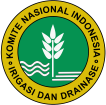Online Submissions
Already have a Username/Password for JURNAL TEKNIK HIDRAULIK?
Go to Login
Need a Username/Password?
Go to Registration
Registration and login are required to submit items online and to check the status of current submissions.
Author Guidelines
General Provisions: What is meant by "Manuscript" in this guideline is a research article or study on hydraulic engineering and geotechnical waters that has not been and will not be published in other print media. The author of the manuscript must make and sign a stamped statement stating that the manuscript written is the result of his own work and has never been published in other media. For registration, authors can register through the website: https://jurnalth.pusair-pu.go.id/index.php/JTH/user/register . The Manuscript should be prepared according to the following author guidelines and Template. The manuscript template can be downloaded here.
Manuscript Writing Requirements: The language used in writing the manuscript is Indonesian or English. The manuscript is uploaded through the website in MS Word format, typed on A4 paper with a left margin and upper margin of 3 cm, bottom 2.5 cm and right 2 cm, using Cambria typeface, font size 10, and space single.The number of manuscript pages is 10, 12, 14 or 16 pages with the following Writing Systematics:
a. Title
The title is an effective and interesting sentence not exceeding 15 words, not the name of the method or activity, written in Indonesian and English.
b. Author's name
The author's name, institution name and electronic address are written in full without titles accompanied by information on the institution's address and city. If the author is more than one person, the names are written in one line. Each author is given a sequential number (super script).
c. Abstract
The abstract should contain a brief statement of what and why the research was conducted, how and the method of research conducted, the analysis required and what was found, general conclusions and specific conclusions from the discussion results, what lessons were learned from the research results. Abstracts are written in Indonesian and English in accordance with correct rules, contain 200 - 250 words, written in one paragraph, avoid the use of abbreviations, and under the abstract are listed 5 keywords.
d. Introduction
The introduction contains at least: Background containing scientific reasons and actual phenomena that are important to research; Introduction to the profile of the study/research area along with an explanation of the reasons for its selection; What actual problems need to be solved; Objectives and benefits of research; Research location; Literature Review.
e. Methodology
The methodology should contain at least: general research methods; research methods to answer objectives and target hypotheses (if any); primary data collection or sampling methods, measurement methods and statistical testing (if any); methods that include probabilistic (statistical tests) and/or deterministic (mathematical) hypothesis testing if any.
f. Results and Discussion
Results and Discussion are organized based on a substantive methodological paradigm, which includes: 1) Results of data analysis/processing relevant to the research objectives; 2) Discussion of analysis results involving verification and validation processes, accompanied by explanations; 3) Discussion of findings or innovations resulting from the problem under study; 4) Correlation of research findings with existing knowledge; 5) Comparing research results with recent and relevant references.
g. Conclusion
The Conclusions consist of specific conclusions from the analytical result or the result of hypothetical testing regarding the phenomena, general conclusion as the result of generalization or the correlation with other phenomena in other locations from relevant publications. The conclusions should be presented as a narrative, not points.
h. Acknowledgments
i. References
References must avoid indications of plagiarism; only references that appear in the manuscript are included in the bibliography or vice versa; references referred to are primary sources (journals, theses, theses, dissertations) as much as 80% of the last 10 (ten) years; except for the latest revision of the guidebook; should not cite your own writing too often (self citation); arranged alphabetically and do not use numbers; for research results at least 10 references, while the results of the study at least 25 references; using reference applications such as Mendeley with the APA Styles system.
Copyright Notice
Before the edition of Vol. 15 No. 1, June 2024 Copyright is still held by the publisher, then for the edition of Vol. 15 No. 1, June 2024 onwards, Copyright is held by the author.
Authors who publish in Jurnal Teknik Hidraulik agree to the following terms:
- Authors retain copyright and grant the journal right of first publication with the work simultaneously licensed under a Attribution-ShareAlike 4.0 International (CC BY-SA 4.0) License that allows others to share the work with an acknowledgment of the work's authorship and initial publication in this journal.
- Authors are able to enter into separate, additional contractual arrangements for the non-exclusive distribution of the journal's published version of the work (e.g., post it to an institutional repository or publish it in a book), with an acknowledgment of its initial publication in this journal.
- Authors are permitted and encouraged to post their work online (e.g., in institutional repositories or on their website) prior to and during the submission process, as it can lead to productive exchanges, as well as earlier and greater citation of published work (See The Effect of Open Access).
Privacy Statement
The names and email addresses entered in this journal site will be used exclusively for the stated purposes of this journal and will not be made available for any other purpose or to any other party.
Author Fees
This journal charges the following author fees.
Article Submission: 0.00 (IDR)
Authors are not required to pay an Article Submission Fee as part of the submission process to contribute to review costs.
Article Publication: 0.00 (IDR)
If this paper is accepted for publication, you will not to be asked to pay an Article Publication Fee to cover publications costs.
There is no waiver policy















